
In Her Shadow
The stories in this collection fuse into a kind of novel, in which Nurit Zarchi journeys back to the world of her childhood. Her father was a writer. After his death, her mother ruled all. Twice widowed, she is depicted as a domineering, emasculating woman, who has had to give up her own artistic ambitions to cope with the harsh demands of Israeli life. Although she insisted on having a piano in her home, she transmits a clear warning to her daughter to steer clear of the arts. But her daughter – the narrator – cannot accept a life of stifling mediocrity and longs to escape to loftier, more satisfying worlds. As she matures, she becomes aware of similarity between herself and her mother. Both grew up without a father, in the shadow of a dominant mother who was hardened and emotionally dulled by the hardships of life. Unlike her mother, however, the narrator is not prepared to surrender her hope of salvation through literature. But her attitude towards it is ambivalent: although it gives her moments of happiness and sublimity, it also entails frustration, loneliness and personal sacrifices.
An absent father and the suitcase of manuscripts that he left behind, life in the shadow of an active, troubled mother, the fraught relationship between a woman writer and her poet husband, a brief romance between a teacher and a young man many years her junior – all these and more are the subjects of Zarchi’s unique and inspired writing.

-
“A remarkable collection ... There is always the same Zarchi quality in her writing, the sense of hovering lightly over reality … In both her children’s books and her adult fiction, there is poetry and mystery. ”
-
“Zarchi enchants her readers with a unique language that she constructs anew with each and every book … [Her] awareness of paradox has an almost primal power, and her symbolism goes hand in hand with everyday descriptions … stirring and thrilling … In each story, she draws near, making everything tangible, and yet maintains a distance.”
-
“Nurit Zarchi’s stories stand out for their rare beauty, for the sadness that is simultaneously seductive and intolerable, and for the economy that creates intentional narrative gaps. The reader finds himself time and again wishing that they will not end – and when they do end, a riddle always remains. ”
